The Checker Maven
The World's Most Widely Read Checkers and Draughts Publication
Bob Newell, Editor-in-Chief
Published every Saturday morning in Honolulu, Hawai`i
Noticing missing images? An explanation is here.
Famous Shots V

Our monthly Checker School column continues today with its series of famous shots in the game of checkers. These are situations that all experts should know and all students should learn, as they do come up over the board, more often than you might think.
Let's look at this month's entry.
11-15 23-19 8-11 22-17 9-13 17-14 10x17 21x14 15-18 19-15 4-8 24-19 13-17----A 28-24 11-16---B 26-23 16-20 31-26---C
A---6-10 is much better here.
B---Turns a relatively small disadvantage into a probable loss. 6-9 would have minimized the damage.
C---A real lesson in the need to keep your head while you're ahead. Instead of playing 15-10 to go on to a probable win, White will now lose!
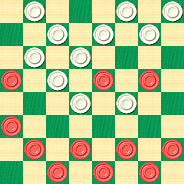
BLACK
Black to Play and Win
B:W32,30,29,27,26,25,24,23,19,15,14:B20,18,17,12,8,7,6,5,3,2,1.
Can you solve it? Can you put a name to the shot? For extra credit, can you name the "shot" shown in the picture at the top?
Try to answer all the questions, and then click on Read More to get all the answers.![]()
Getting Jumpy

Getting jumpy waiting for spring to come? Ready for winter to be over even there might be more cold weather and another snowstorm in the offing??
Be patient; it won't be much longer until winter is left behind.
Our speed problem, though, won't require that much patience. It's fairly easy and can surely be solved in thirty seconds. When you're ready, click below to start the clock and show the position. When you're done, jump your mouse to Read More to check your solution.
March Speed Problem (not too hard; 30 seconds)
![]()
An Exhibition Match
Marvin J. Mavin was in Bellman, Ohio, the home of the National Checker League, for a special gala event to benefit the NCL Youth Fund. Various other top professionals would be playing simultaneous exhibitions, giving lessons and demonstrations, and analyzing games submitted by attendees. But the featured event, the real headliner, would be a single game match-up between Marvin and the President of the NCL, Elan Hallmion.

Marvin J. Mavin
President Hallmion was a former top-ranked professional player; some thought he was every bit as good as Marvin. But there was more to the story.

Elan Hallmion
The truth is, despite Marvin's popularity, President Hallmion was no great fan of Marvin. He didn't like Marvin's antics, especially his beer drinking; he thought it set a rather bad example for young players and fans who idolized Marvin. The scheduled contest between Marvin and Elan was being touted by the press as a "grudge match," although President Hallmion, always the gentleman, said that it was just a charity benefit in which he was most happy to participate. Any grudges, he added, were Marvin's alone.
Marvin, for his part, wasn't quite as gentlemanly. When asked about the match by the press, he said, "Oh, yeah, that dude Hallmion don't like me so much. But hey, whatever, he ain't got my reputation. I'll like, you know, take him on, sure, why not?"
The time for the match soon rolled around. Marvin had arrived in Bellman the previous evening and had spent the day (at least half of it, as he apparently slept until noon) signing autographs and meeting with the hundreds of NCL fans who had come to town for the exhibition.
President Hallmion made sure Marvin was taken to dinner by a couple of NCL officials, who whisked Marvin off to a restaurant that didn't serve beer. The NCL leader wasn't going to risk a possibly embarrassing situation later on when Marvin appeared for his match.

Indeed, at game time, Marvin was on the wagon. He had complained a little at dinner but when it became obvious that it wouldn't do any good, he stopped. He did try to slip away from his escort at one point, but the NCL officials were quite alert and Marvin didn't succeed.
The crowd cheered equally for both Marvin and President Hallmion. While Marvin was a darling of the fans, President Hallmion was highly respected for his integrity and his very competent management of the affairs of the NCL.
After shaking hands--- was Marvin a little reluctant?--- the contestants sat down to play. Marvin had drawn the Black pieces and President Hallion the White. The game started out as follows.
| 1. | 10-15 | 22-17 |
| 2. | 15-19 |
Marvin had what some thought to be the harder end of this 3-move ballot, but he seemed quite unperturbed, although he was doing his normal fidgeting.
| 2 | ... | 24-15 |
| 3. | 11-18 | 23-14 |
| 4. | 9-18 |
After the double exchange, White has a small advantage; and President Hallmion knew it. In fact, he appeared to be smiling ever so slightly.
| 4. | ... | 17-13 |
26-23 might have been stronger. Marvin glanced up at his opponent, evidently surprised by this move.
| 5. | 5-9 | 21-17 |
| 6. | 8-11 | 28-24 |
| 7. | 4-8 |
11-15 or 9-14 would have been better. Had Marvin's concentration lapsed? In professional checkers, that often proves fatal.
| 7. | ... | 17-14 |
White seizes the advantage....
| 8. | 1-5 | 24-20 |
... only to give it back again. 24-19 would have held the lead. Marvin actually looked relieved at this turn of events. "Well there, Shorty," Marvin said, most disrespectfully, "ya thought ya had something, didn't ya! But now ya ain't got nothing."
| 9. | 11-15 | 26-23 |
| 10. | 8-11 | 25-21 |
| 11. | 12-16 | 32-28 |
| 12. | 3-8 | 27-24 |
| 13. | 18-27 | 31-26 |
| 14. | 9-18 | 24-19 |
| 15. | 16-23 | 26-3 |
Seeing this clever shot, the crowd oohed and aahed and then broke out into applause for President Hallmion. Meanwhile Marvin was frowning and scratching his head perplexedly.
| 16. | 8-12 | 3-8 |
| 17. | 11-15 | 8-11 |
| 18. | 27-31 | 30-25 |
President Hallmion sat back in his chair, and being the gentleman that he was, merely smiled. Marvin was in a tough spot and was going to have to think hard if he was to save the draw. "What's with this?" Marvin said. "You can't win, Shorty, you just can't!" The crowd, hearing this, let out a collective grumble. They all loved Marvin, but they also expected President Hallmion to be treated with proper respect.
Can you find the draw in this critical position? Can Marvin? Try to solve it, and then click on Read More for the solution and the rest of the story.
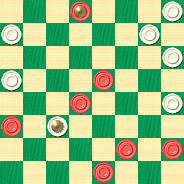
BLACK
Black to Play and Draw
B:W29,28,25,21,20,13,K11:BK31,18,15,12,6,5,2.
![]()
The Champions' Choice
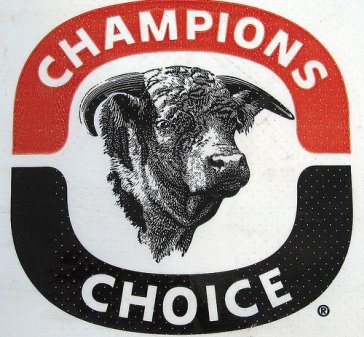
The photo above apparently advertises for something called "The Champion's Choice Trace Mineral Salt Block." It's intended for livestock, not checker players, unless there are some checker-playing cows out there. Certainly, though, there are many checker-playing raisers of livestock, so the photo might just be relevant after all. Besides, "The Champion's Choice" is Willie Ryan's title for today's checker study.
As we've mentioned before, the last installments of Willie Ryan's Tricks Traps & Shots of the Checkerboard are pretty long and complex. We've broken today's study into two parts. We'll present the second part in our next regular installment.
The study looks at the Cross Choice opening and it's fascinating to say the least. Let's let Willie tell us more.
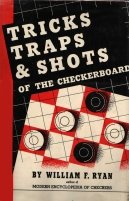
"The Cross Choice opening, formed by 11-15, 23-18, 9-14, has long been a favorite battleground of the champions, and some of the most spectacular wins on the record have been scored on it. The following analytical study of this colorful debut bristles with brilliant play and unusual combinations:
| 11-15 | 17-13 | 7-10 |
| 23-18 | 2-6---C | 21-17*---F3 |
| 9-14 | 23-18*---D,2 | 16-19 |
| 18-11 | 14-23 | 29-25---G |
| 8-15 | 27-18 | 19-24---H |
| 22-17 | 10-14---E | 28-19 |
| 4-8 | 31-27*---F | 15-24 |
| 25-22 | 14-23 | 25-21* |
| 8-11---A,1 | 27-18 | 3-8---I, |
| 26-23---B | 12-16---F1 | to the |
| 6-9 | 24-20---F2 | diagram |
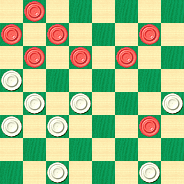
WHITE
White to Play and Draw
W:W32,30,22,21,20,18,17,13:B24,11,10,9,8,6,5,1.
A---7-11 is also good, as shown in Variation 1.
B---As played by Champions Rubin and Hunt. In view of the improved attack innovated at C, this 26-23 move will henceforth occupy a lower rating among the master minds. Probably the best move here for a draw is---B1: 17-13, 11-16, 22-17, 16-20 (16-19, 29-25, 7-11, 24-20, 2-7, 27-24, may be used as a plausible alternative), 26-23, 7-11, 29-25, 3-7, 24-19 (23-19, 5-9, 25-22, 14-18, 17-14, 18-25, 14-5, 25-29, 21-17, 11-16, 17-14, 16-23, 27-11, 20-27, 32-23, 7-16, 14-7, 2-11, 31-26, 11-15, 23-19, etc. produces the draw), 15-24, 28-19, 11-15, 32-28, 15-24, 28-19, 7-11, 31-26*, 11-15, 19-16, 12-19, 23-16, 15-19, 26-23, 19-26, 30-23, 10-15, 17-10, 15-19,10-7, 19-26, 27-23, 2-11, 16-7, 26-31, 23-19, 31-26, 19-16, 26-23, 25-22. Sam Levy, Manchester, England, 1937.
B1---The computer thinks 7-11 and 8-11 are about equally good and finds 17-13 to be a lesser choice---Ed.
C---Inaugurates a baffling attack, suggested to me by John T. Bradford. It improves upon the combination of: 14-17, 13-6, 17-26, 31-22, 2-9, 23-19 (used by Edwin F. Hunt, Nathan Rubin, and Asa Long in games played by them), which leaves black with a draw at best and no chance of winning. This 2-6 puts muscle in the black build-up and promptly takes the snapper out of white's formation. If black tries 1-6 at C, then we have a familiar Denny development, strong for white, which runs its course like this to a draw: 1-6, 23-19, 14-17, 21-14, 9-25, 29-22, 5-9, 27-23, 9-14, 24-20, 15-24, 28-19, 14-17, 31-26, 11-15, 32-28, 15-24, 28-19, 7-11, 22-18, 3-7,19-16,12-19,23-16, 6-9,13-6,2-9,16-12,17-21,12-8,10-15, 26-22, 7-10, 20-16, 11-20, 18-11, 10-15, 8-3, 15-19, 3-7, 19-23, 7-10, 23-27, 10-15, 20-24, 15-18, 9-13*, 11-7, 27-31, 7-2, 24-28, 2-7, 28-32, 7-10, 31-27. Wm. F. Ryan vs. Jesse B. Hanson, 1927.
D---The key to the situation, cramping mobility of the black pieces on squares 1, 5, 6, and 9. A good draw by any other move is hard to find, and even the text must be followed through by the subtle touches at J. For play on 23-19 at this point, see Variation 2---an exposition in hairline draughts! Ed.'s note: Variation 2 will be published next month.
E---This press is obviously the only move to gain a draw. If 12-16 is played, 24-20 wins.
F---31-26, 14-23, 26-10, 7-14, 29-25, 12-16, 32-27 or 30-26, then 11-15 leaves white irreparably impaired.
F1---The end of the KingsRow opening book, with an equal evaluation---Ed.
F2---It takes some deep computer analysis to reveal that 32-27 is the best move here, though any Black edge is tiny indeed---Ed.
F3---Willie stars this move, but 32-27 also is good---Ed.
G---The shot by 17-14, 10-26, 30-7, 15-22, 7-2, 22-26, leaves black with much the better ending, though a win would be hard to prove. The strength of the black ending rests in ultimately relieving the four man tie-up of his pieces on 1, 5, 6, and 9. This is accomplished by crowning the piece on 22, returning the king to square 18, and then conditionally "slipping" 9-14, 2-9, 14-17, thus removing the white king on square 2 from play. On such "ideas" and tactical threats is the game of checkers based. The more knowledge a student acquires of these principles of play, and the more adept he is in knowing when and how to threaten with the proper plan for a particular setup, the greater is his skill. The proficient planner makes the player.
H---Or 19-23, 28-24 (better than 20-16, 11-20, 18-11, 9-14, 25-21, 5-9, black strong), 3-8, 20-16, 11-27, 18-4, 27-31, 4-8, 31-27, 8-11, 27-24, 11-8 will also reach a draw. Wm. F. Ryan.
I---24-28, 30-26, 3-8, 17-14, 10-17, 21-14, 8-12, 22-17, 11-15, 18-11, 9-18,11-7,18-22, 26-23, 22-26, 23-18, 26-30,18-14, 30-25, 7-2, 25-22, 2-9, 22-18, 32-27, 28-32, 27-23, 18-27, 9-6 produces the draw. Wm. F. Ryan.
J---The timely rescue for white.
Variation 1
| 7-11 | 22-17 | 10-17 | 25-22 | 11-16 |
| 29-25 | 3-7 | 21-14 | 12-16 | 2-7 |
| 12-16 | 31-27---A | 18-23 | 22-18 | 31-26; |
| 24-20 | 1-5---B | 20-16 | 16-19 | drawn. |
| 16-19 | 27-23 | 11-27 | 1-6 | Wm. F. |
| 27-24 | 14-18 | 28-24 | 2-9 | Ryan. |
| 5-9 | 23-14---C | 19-28 | 13-6 | |
| 17-13 | 9-18 | 26-1 | 7-11 | |
| 8-12 | 17-14 | 27-31 | 6-2 |
A---White dares not go 32-27, since he will be stung by 19-23. However, white can travel safely to a draw with: 26-23, 19-26, 30-23, 1-5 (nothing better), 23-19*, 11-16, 20-11, 7-23, 24-19, 15-24,28-19,14-18,17-14,10-17, 21-14,2-7,19-15,12-16,15-11, 6-10, 11-2, 10-17, 13-6, 17-21, 2-7, 21-30, 7-11, 16-20, 31-26. Wm. F. Ryan.
B---If the play goes 11-16, 20-11, 7-16, 27-23, the breakup by 15-18 will promote a draw; but if the move is 2-7, white will reply with 32-27*, and black's position is perilous.
C---Or 23-16, 12-19, 17-14, 10-17, 21-14, 18-23, 14-10, 7-14, 20-16, 11-27, 28-24, 19-28, 26-1, 27-31, 13-6, 2-9, 1-6, 9-13, 25-22, 14-17, 22-18, 17-22, 18-14, 13-17, 6-9, 17-21, 9-13, also ending in a draw. John T. Bradford."
Ed.'s Note: Variation 2 will appear in the next installment.
Here's the diagram once again.

WHITE
White to Play and Draw
W:W32,30,22,21,20,18,17,13:B24,11,10,9,8,6,5,1.
Can you make the champion's choices here and solve the problem? Will you be a champ or a chump? We think if you give it a good try, you're a champ no matter. When you've chosen your moves, click on Read More to see the solution.![]()
Famous Shots IV

This month brings the fourth entry in our Famous Shots series, taken from Ben Boland's Famous Positions in the Game of Checkers. As always, the challenge is to solve the shot, and, if you wish, identify the "shot" pictured above.
Here's the run-up:
11-15 21-17 9-13 25-21 8-11 17-14---A 10x17 21x14 6-10 22-17 13x22 26x17 15-18 24-20---B 2-6 28-24 4-8---C 29-25 11-15 30-26 6-9---D
A---30-25 is better; Black now gets a small but noticeable advantage.
B---23-19 is better. Black's advantage is now significant.
C---6-9 would retain the Black advantage. The game is now about even.
D---Loses. 15-19 was correct.
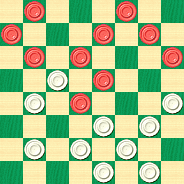
WHITE
White to Play and Win
W:W32,31,27,26,25,24,23,20,17,14:B18,15,12,10,9,8,7,5,3,1.
Aw, shoot; we're pretty much out of "shot" puns, so all we'll say is to see if you can solve it and then click on Read More to see the solution.![]()
A Short Speedster
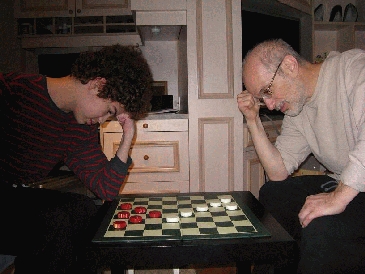
For February, the shortest month, we're pleased to present another short speed problem from father and son team Lloyd and Josh Gordon of Toronto, Ontario, Canada. It features a practical over-the-board situation and is relatively easy (hence a 10 second time limit).
We invite other readers to submit similar problems, suited for solving in anything from five seconds to one minute. Meanwhile, a big "mahalo" (thanks) to Lloyd and Josh.
When you're ready, click on the link below; then come back and click on Read More to verify your solution.
February Speed Problem (Easy, 10 seconds)
![]()
Man Up

Today's Beginner's Corner episode deals once again with that "you've got to win it" idea. A man up is usually a win, but short of the expert level, the other player isn't just going to concede; you'll have to show that you know how to win it.
Here's one such situation.
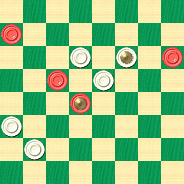
WHITE
White to Play and Win
W:W25,21,15,K11,10:BK18,14,12,5.
Can you "man up"* and win with a man up? We think you can. Prove us right by solving the problem and then clicking on Read More to see the solution.
*Editor's Note:: The image at the top of this article is intended to express the idea that both men and women play and excel at checkers.![]()
Hobson's Choice
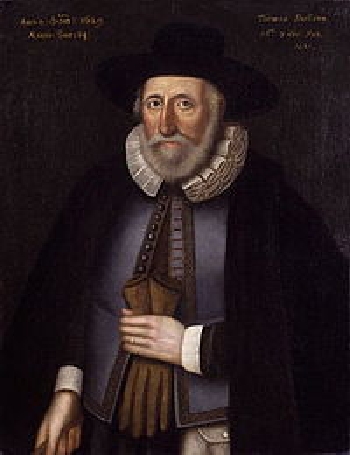
The phrase Hobson's Choice, named for 16th century English stable owner Thomas Hobson, is often used to describe a no-win situation. In checkers, that would occur when any move available would be bad; in other words, a player would be left to choose only among various losing options.
That usage, though frequently employed, is incorrect, as Hobson's Choice really means "take it or leave it"; you have but one option and there really is no choice except that of refusal. (Mr. Hobson reputedly offered his customers a choice of but one horse, which was no choice at all.) In checkers, however, you've got to make a move, so the phrase Hobson's Choice doesn't seem to apply.
We think, in the position below, as published by Ben Boland in Familiar Themes in the Scientific Game of Checkers, the author meant to use the term dilemma, which accurately refers to a choice among undesirable alternatives. Contrast this with Morton's Fork, which is a choice among equal or equivalent alternatives.
Confusing? Perhaps simply looking at the diagram is the best option.
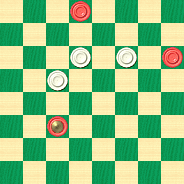
WHITE
White to Play and Draw
W:W14,11,10:BK22,12,2.
White indeed seems to face a dilemma; he's going to lose a man no matter what choices he makes. But a draw is still possible with perceptive play; can you find it?
Of course, for you, the reader, the choice is certainly Hobson's; you can choose to solve the problem, or just leave it! We do hope, though, that you'll try it, and then click on Read More to verify your solution.![]()
Famous Shots III

Checker School today brings us the third in our series of famous shots, taken from Ben Boland's Famous Positions in the Game of Checkers. As is the case with the other entries in this series, experienced players should recognize it by sight, while less experienced players would do well to learn the position.
Here's this week's run-up:
11-15 23-19 8-11 22-17 4-8 17-13 15-18 24-20 11-15 28-24 8-11 26-23 9-14 31-26 6-9 13x6 2x9 26-22 9-13---A
A---Loses. 3-8 or 1-6 would be correct. White to play and win.
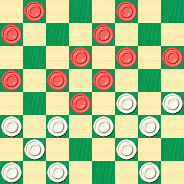
WHITE
White to Play and Win
W:W32,30,29,27,25,24,23,22,21,20,19:B18,15,14,13,12,11,10,7,5,3,1.
We're not sure which looks more interesting: the checker position or the attractive concoction shown in the photo at the top. Right now, though, let's go for the checker position. Find the solution, name the shot (both of them!), and then click on Read More to see the solution.![]()
The Holidays Sped By

The holidays have sped by as they always do; there's the long run-up, a week or so of family fun and frolics, and then--- it's over, and we face that winter letdown and months of solid, virtually uninterrupted work, school, or what-have-you.
Fortunately, there's a bright spot for readers of The Checker Maven. For some little while, the father and son team of Lloyd and Josh Gordon, of Toronto, Ontario, Canada, have been replenishing our stock of speed problems, with positions from their own games and of their own design. We're presenting the first of these today.

Photo by Mrs. Lloyd Gordon
Josh and Lloyd generally assemble problem positions that vary from easy to medium in difficulty, making them perfect for speed problems. This month we'll start with an easy one. You won't have a lot of trouble solving it, and it's quite clever and pleasing. Ten seconds will be plenty of time, we think, although perhaps you may disagree!
When you're ready, click on the link below to show the problem and start the clock. Then come back here and click on Read More to verify your solution.
January 2014 Speed Problem Easy; 10 seconds
Thank you, Josh and Lloyd, for sending these problems, and we hope that the rest of your Eastern Ontario winter won't be too tough.![]()
The Checker Maven is produced at editorial offices in Honolulu, Hawai`i, as a completely non-commercial public service from which no income is obtained or sought. Original material is Copyright © 2004-2026 Avi Gobbler Publishing. Other material is public domain, AI generated, as attributed, or licensed under CC1, CC2, CC3 or CC4. Information presented on this site is offered as-is, at no cost, and bears no express or implied warranty as to accuracy or usability. You agree that you use such information entirely at your own risk. No liabilities of any kind under any legal theory whatsoever are accepted. The Checker Maven is dedicated to the memory of Mr. Bob Newell, Sr.


